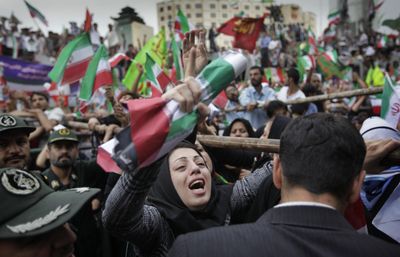Iran vote unrest grows
Rival camps stage competing rallies

TEHRAN, Iran – Protesters battled police over Iran’s disputed election and shouted their opposition from the rooftops Sunday, but President Mahmoud Ahmadinejad dismissed the unrest as little more than “passions after a soccer match” and drew his own huge rally of support.
Just after sundown, cries of “death to the dictator” echoed through Tehran as thousands of backers for Ahmadinejad’s rival, Mir Hossein Mousavi, heeded a call to bellow from the roofs and balconies. The deeply symbolic act recalled the shouts of “Allahu Akbar,” or God is Great, to show opposition to the Western-backed monarchy before the 1979 Islamic Revolution.
The scenes summed up the showdown over the disputed elections: an outwardly confident Ahmadinejad exerted control, while Mousavi showed no sign of backing down and could be staking out a new role as powerful opposition voice.
His charges that Friday’s vote was riddled by fraud brought sympathetic statements from Vice President Joe Biden and other leaders. Mousavi made a direct appeal with Iran’s ruling clerics to annul the result, but the chances were considered remote.
Authorities detained top Mousavi aides, including the head of his Web campaign, but many were released Sunday after being held overnight.
Iran’s deputy police chief, Ahmad Reza Radan, told the official Islamic Republic News Agency that about 170 people have been arrested. It was not known how many remained in custody.
Mousavi has urged his supporters to channel their anger into peaceful acts of dissent. But the official clampdown on the Internet links blunted the reach of the message. At the same time, Mousavi went to the pinnacle of power to try to reverse the election decision.
In a letter to the Guardian Council – a powerful 12-member clerical body closely allied to Supreme Leader Ayatollah Ali Khamenei – he claimed “fraud is evident.”
The letter, posted on Mousavi’s Web site that is accessible outside Iran, didn’t specify his allegations but claimed that his envoys were unfairly blocked from monitoring polling stations. Iran does not allow outside or independent election observers. The Guardian Council must certify all election counts.
Mousavi later met Khamenei – who has almost limitless power – to press his appeal, said Shahab Tabatabaei, a prominent activist in Mousavi’s pro-reform camp.
It was likely a long-shot mission by Mousavi, 67, who served as prime minister in the 1980s. Khamenei has already given his blessing to the election outcome and it would be extraordinary for him to publicly change his position.
In Tehran, the day was marked by protests from both sides.
Less than a 10-minute walk from Ahmadinejad’s news conference, protesters raged through streets and lit piles of tires as flaming barricades to block police. About 300 Mousavi supporters gathered outside Sharif University, chanting “Where are our votes?”
By midafternoon, tens of thousands of Ahmadinejad supporters filled Vali Asr Street – the same place a massive pre-election rally was held by Mousavi last week. Ahmadinejad’s forces waved Iranian flags and green Islamic banners, an obvious response to Mousavi’s campaign that adopted green as its trademark color.
After dark, came the cries from the rooftops across Tehran. Using Web chat lines, phone calls and word of mouth, the message was passed for Mousavi’s backers to shout “death to the dictator” and “Allahu Akbar.”